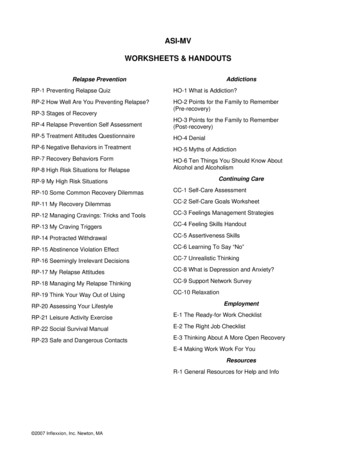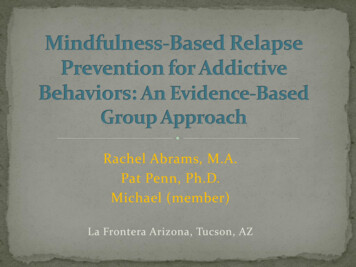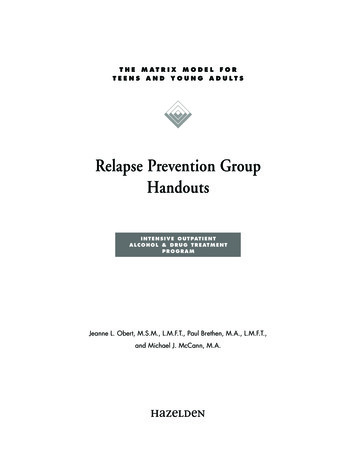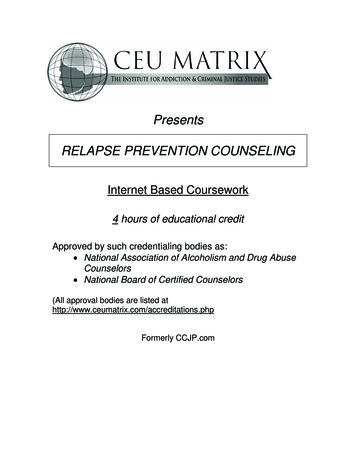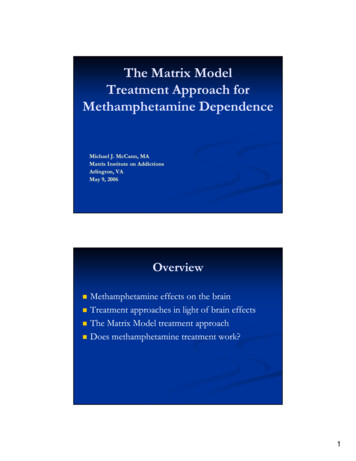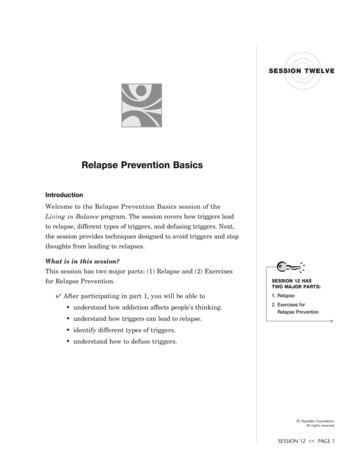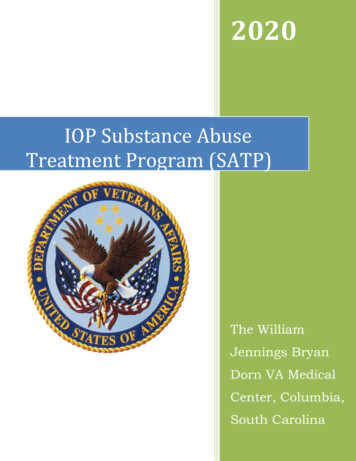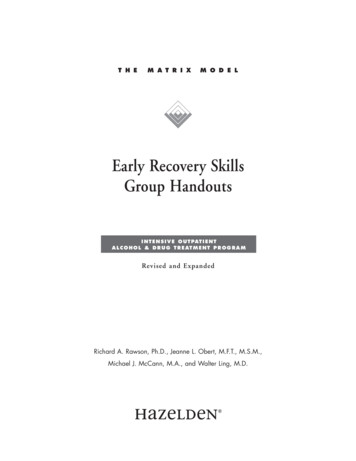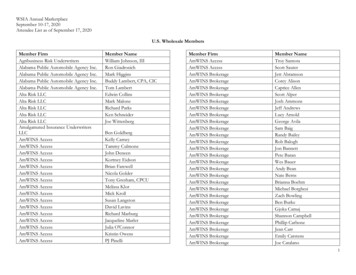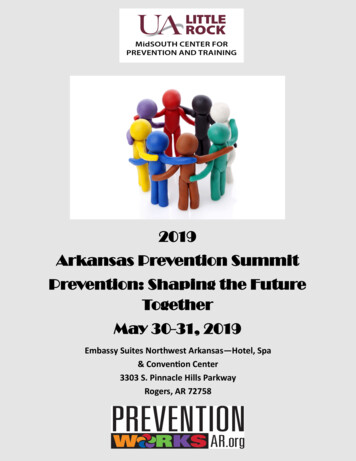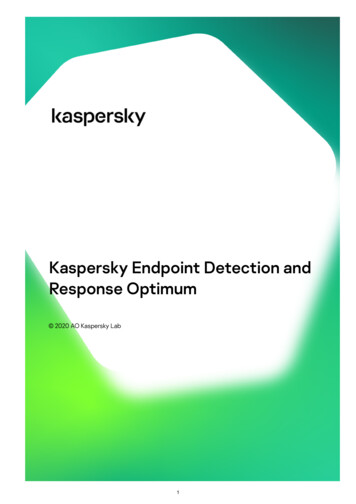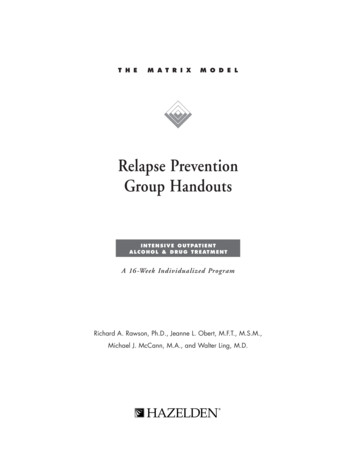
Transcription
T H EM A T R I XM O D E LBRelapse PreventionGroup HandoutsI N T E N S I V E O U T PAT I E N TA L C O H O L & D R U G T R E AT M E N TA 16 -Week Individualized ProgramRichard A. Rawson, Ph.D., Jeanne L. Obert, M.F.T., M.S.M.,Michael J. McCann, M.A., and Walter Ling, M.D.HAZELDEN
HazeldenCenter City, Minnesota 55012-01761-800-328-90001-651-213-4590 (Fax)www.hazelden.org 2005 by Matrix InstituteAll rights reserved. Published 2005Printed in the United States of AmericaDuplicating these handouts for personal or group use is permissibleThe Matrix Model is a registered trademark of the Matrix Institute.
BRelapse Prevention Group HandoutsDATECOMPLETEDSession 1Handout 1: Alcohol: The Legal Drug . . . . . . . . . . . . . . . . . . . . . . . . . . . . . . . . . . . . . . . .1Session 2Handout 2: Boredom . . . . . . . . . . . . . . . . . . . . . . . . . . . . . . . . . . . . . . . . . . . . . . . . . . . . . . . .5Session 3Handout 3A: Avoiding Relapse DriftHandout 3B: Mooring Lines Recovery Chart.7.9.11.13.15Session 4Handout 4: Work and RecoverySession 5Handout 5: Guilt and ShameSession 6Handout 6: Staying BusySession 7Handout 7: Motivation for Recovery . . . . . . . . . . . . . . . . . . . . . . . . . . . . . . . . . . . . . . . . 17Session 8Handout 8: Truthfulness.19Session 9Handout 9: Total Abstinence.21Session 10Handout 10: Sex and Recovery.23Session 11Handout 11: Relapse Prevention . . . . . . . . . . . . . . . . . . . . . . . . . . . . . . . . . . . . . . . . . . . . 25continuediii
Relapse Prevention Group HandoutsDATECOMPLETEDSession 12Handout 12: Trust.27Session 13Handout 13: Be Smart, Not Strong.29.31Session 14Handout 14: Defining SpiritualitySession 15Handout 15: Taking Care of Business and Managing Money.33.37.39Session 16Handout 16: Relapse Justification ISession 17Handout 17: Taking Care of YourselfSession 18Handout 18: Dangerous Emotions . . . . . . . . . . . . . . . . . . . . . . . . . . . . . . . . . . . . . . . . . . 41Session 19Handout 19: Illness.43Session 20Handout 20: Recognizing Stress.45Session 21Handout 21: Relapse Justification II.47Session 22Handout 22: Reducing Stress . . . . . . . . . . . . . . . . . . . . . . . . . . . . . . . . . . . . . . . . . . . . . . . 49Session 23Handout 23: Managing Anger . . . . . . . . . . . . . . . . . . . . . . . . . . . . . . . . . . . . . . . . . . . . . . . 51continuediv
Relapse Prevention Group HandoutsDATECOMPLETEDSession 24Handout 24: Acceptance.53Session 25Handout 25: Making New Friends . . . . . . . . . . . . . . . . . . . . . . . . . . . . . . . . . . . . . . . . . . 55Session 26Handout 26: Repairing Relationships.57.59Session 27Handout 27: Serenity PrayerSession 28Handout 28: Compulsive Behavior.61Session 29Handout 29: Dealing with Feelings and Depression . . . . . . . . . . . . . . . . . . . . . . . . 65Session 30Handout 30: Twelve Step Programs (or Other Spiritual Groups).69.71Session 31Handout 31: Looking Forward: Dealing with DowntimeSession 32Handout 32: One Day at a Time . . . . . . . . . . . . . . . . . . . . . . . . . . . . . . . . . . . . . . . . . . . . 73Session 33 (Optional)Handout 33: Recreational Activities.75Handout 34: Holidays and Recovery.77 v
Handout 1 Relapse Prevention GroupAlcohol: The Legal DrugIt is often difficult for patients to stop drinking when they entertreatment. Some of the reasons for this include the following:1. Triggers for alcohol use are everywhere. It is sometimes hard to do anything socialwithout facing people who are drinking.Do you have friends who get together without drinking? If so, write theirnames here.2. Many people use alcohol in response to internal triggers. Depression and anxietyseem to go away when people have a drink. It’s difficult for them to realize thatsometimes the alcohol causes the depression.Does feeling a certain way make you want to have a drink? Explain.3. If a person is addicted to an illicit drug and uses alcohol less often, alcohol maynot be viewed as a problem. The problem isn’t recognized until the person tries tostop drinking.Have you been able to stop drinking since you entered treatment? Explain.4. Alcohol affects the rational, thinking part of the brain. It is hard to think reasonablyabout a drug that makes thinking clearly more difficult.Have you ever been sober at a party and watched people drink and “getstupid” ? If so, describe the experience.1continued on other side
Handout 1 Relapse Prevention GroupALCOHOL: THE LEGAL DRUGPage 2 of 3continued5. Because alcohol dulls the rational brain, it promotes less controlled activity in thelower brain. This results in alcohol helping people become more sexual, less selfconscious, and more social. When you are used to using alcohol to increase sexualpleasure and help you socialize, these activities feel uncomfortable without it.Do you depend on alcohol for sexual or social reasons? Explain.6. Many of us grow up using alcohol to mark special occasions. It is hard to learnhow to celebrate those times without drinking.What special occasions did your family celebrate with alcohol?How do you celebrate now?7. In many families and social groups, drinking is a sign of strength, of being“with it,” or of being sophisticated. Our culture encourages drinking.Do you feel less “with it” when you are not drinking? Explain.2
Handout 1 Relapse Prevention GroupPage 3 of 3ALCOHOL: THE LEGAL DRUG8. The habit of drinking gets to be part of certain activities. It seems difficult, at first,to eat certain foods, go to sporting events, or relax without a beer or other drink.What activities seem to go with drinking for you? It is important to remember that everyone who stops drinking has these problems atfirst. As you work through the difficult situations and spend more time sober, it doesget easier.Triggers for alcohol use are everywhere. It is sometimes hard to doanything social without facing people who are drinking.3
Handout 2 Relapse Prevention GroupBoredomOften, people who stop usingdrugs and alcohol say life feels boring.Some of the reasons for this feeling might be these:1. A structured, routine life feels different from an addict lifestyle.2. Brain chemical changes during recovery can make people feel flat (or bored).3. Drug and alcohol users often have huge emotional swings (high to low andback to high). Normal emotions can feel flat by comparison.People with longer sobriety rarely complain of continual boredom, so these feelingsdo change. Meanwhile, there are some ways to help reduce this feeling.1. Review your recreational activity list. Have you started doing things that youenjoyed before using drugs and alcohol? Have you begun new activities thatinterest you?2. Can you plan something to look forward to? How long has it been since you’vetaken a vacation?3. Talk about this feeling with a mate or close friend. Does he or she feel bored, too?Does he or she have any interesting suggestions?4. Try going back to scheduling. Forcing yourself to write out daily activities helpsyou see where you can schedule in more interesting experiences.5. Do something risky that will further your personal growth. Sometimes boredomresults from not challenging yourself enough in your daily living. Which of the above might work for you? It is important to try new ways of fighting thebored feeling. Untreated, it can be a trigger and move you toward relapse.5
Handout 3A Relapse Prevention GroupAvoiding Relapse DriftHow It HappensRelapse does not suddenly occur. It does nothappen without warning, and it does not happen quickly.The gradual movement, however, can be so subtle and so easily explained away(denied) that often a relapse feels like it happened suddenly. This slow movementaway from sobriety can be compared to a ship gradually drifting away from whereit was moored. The drifting movement can be so slow that you don’t even notice it.Interrupting the ProcessDuring recovery, each person does specific things that work to keep him or her sober.These “mooring lines” need to be clearly stated and listed in a very specific way sothey are understandable and measurable. These are the ropes that hold the recoveryin place and prevent the relapse drift from happening without being noticed.Maintaining a RecoveryUse the Mooring Lines Recovery Chart (page 9) to list and track the things that areholding your recovery in place. Follow these guidelines when filling out the form:1. Identify four or five specific things that are now helping you stay sober(for example, working out for twenty minutes, three times per week).2. Include items such as exercise, therapist and group appointments, scheduling,outside spiritually based meetings, and eating patterns.3. Do not list attitudes. They are not as easy to measure as behaviors.4. Note specific people or places that are known triggers and need to be avoidedduring recovery.The checklist should be completed regularly (probably weekly). When two or moreitems cannot be checked, it means that relapse drift is happening. Sometimes thingsloosen your mooring lines. Vacations, illnesses, and holidays sometimes cannot becontrolled. The mooring lines disappear. Many people relapse during these times. Usethe chart to recognize when you are more likely to relapse and decide what to do tokeep this from happening. 7
Handout 3B Relapse Prevention GroupMooring Lines Recovery ChartIn becoming sober, you have had to learn to adopt certain newbehaviors—behaviors that work for you to keep you sober.It is too easy to accidentally drop one or more of these mooring lines and allow yourrecovery to drift toward relapse. Charting the new behaviors and occasionally checkingto make sure the lines are secure can be very useful.Use the chart below to list those activities that are very important to your continuingrecovery. If there are specific people or things you need to avoid, list them. Then lookback at your list regularly and check those items that you are continuing to follow tostay anchored in your recovery.Mooring Line BehaviorsDate ( )Date ( )Date ( )Date ( )Date ( )Date ( )Date ( )Date ( )Date ( )Date ( )1.2.3.4.5.I Am Avoiding1.2.3.4.5.9
Handout 4 Relapse Prevention GroupWork and RecoveryCheck which of the following statementsdescribe your situation:1. I am employed in a demanding job that makesinpatient treatment impossible.2. I am working in an unsatisfactory job and thinking of making a change.3. I am working in a situation in which recovery will be difficult.4. I am working with a schedule that has to be changed to make treatmentwork.5. I am unemployed and need to find a job. People in any of the above situations have to deal with certain problems that canmake treatment more difficult. Some of the problems are outlined below; the numberscorrespond to the list above.1. People in this situation always have to look at priorities. Outpatient treatmentmay have been selected because work is a number one priority. The problem isthat treatment won’t work unless it is given a 100 percent effort. That means thatfor a while, treatment has to take priority over work. Once longer-term sobrietyhas been achieved, the recovery can shift to maintenance intensity, and work canagain be a major focus.2. It is a generally accepted fact that during recovery, major changes (in jobs, relationships, and other areas) should be delayed for six months to one year wheneverpossible. There are many reasons for this:a. People in recovery go through large changes themselves and sometimeschange their views on personal situations.b. Any change is stressful, and major stress is to be avoided as much aspossible during early recovery.11continued on other side
Handout 4 Relapse Prevention GroupWORK AND RECOVERYPage 2 of 2continued from other side3. Some jobs lend themselves to recovery more than others. Work situations thatare difficult to combine with outpatient treatment include the following:a. Situations in which it is necessary to be with other people who aredrinking or usingb. Jobs that make large sums of cash money available at unpredictable times4. Some jobs require long or unusual hours. Often, the very nature of the schedulehas contributed to the drug or alcohol problem in the first place. The first task, ifyou have such a job, is to work with your therapist (and your boss or someone elseat your job) to make your schedule work for your recovery. Without this initialintervention, your recovery will not stand a chance. Recovery is much too difficulta process unless it is your number one priority while you are in treatment.5. When people are out of work, treatment becomes more difficult:a. Looking for work is often a necessary priority.b. Without blocks of time spent at work, there is so much free time that itis difficult to fill it and provide the structure that makes outpatienttreatment effective.c. Resources are often more limited, making factors like transportation andchild care more of a problem. There are no easy solutions to these problems. It is important to be aware of the issuesso you can plan to make your recovery as strong as possible.When people are out of work,resources are often more limited,making factors like transportationand child care more of a problem.12
Handout 5 Relapse Prevention GroupGuilt and ShameGuilt is feeling bad about what you have done.(“I am sorry I spent so much time using/drinkingand not attending to my family.”) Shame is feeling bad about who you are.(“I am hopeless and worthless.”)GuiltWhat are some things you have done in the past that you feel guilty about?Feeling guilty is a healthy reaction. It often means you have done something thatdoesn’t agree with your values and morals. It is not unusual for people to get intosituations where they do things they feel guilty about. What is important is makingpeace with yourself. Sometimes that means making up for things you’ve said anddone. Sometimes it means realizing you are feeling guilty unnecessarily.Remember:1. It’s all right to make mistakes.2. It’s all right to say, “I don’t know,” “I don’t care,” or “I don’t understand.”3. You don’t have to explain yourself to anyone if you’re acting responsibly.Do you still feel guilty about the things you listed? What can you do to improve thesituation(s)?13continued on other side
Handout 5 Relapse Prevention GroupGUILT AND SHAMEPage 2 of 2continued from other sideShameCheck the statements that apply to you:I feel ashamed of being addicted.I feel weak because I couldn’t or can’t stop drinking or using.I feel stupid because of what I have done.I feel like I am a bad person because I am involved with alcohol or drugs. No one knows all the reasons that some people can stop using once they decide toand other people cannot. Research shows some of the reasons have to do with familyhistories, genes, and individual physical differences in people. They do not have to dowith some people being bad, stupid, or weak. Addiction affects people differently.What we do know is that you cannot recover by these means:1. Trying to use willpower2. Trying to be strong3. Trying to be goodIt takes two things to make recovery work:1. Being smart2. Working hard Everyone who is successful at recovery will tell you, “It was the hardest thing I everdid.” No one can do it for you, and it will not just happen to you.14
Handout 6 Relapse Prevention GroupStaying BusyLearning to schedule and to provide a structure ofactivities to support your recovery is an important first stepin outpatient treatment. Staying busy doing things isimportant for several reasons:1. Often, relapses begin in the mind of a person who has nothing to do and nowhereto go. The addicted brain begins to think about past using, and the thoughts canstart the craving process.Has free time ever been a trigger for you? Explain.How could you respond to prevent relapse if the trigger occurred again?2. When drug and alcohol use gets severe enough, the user will often begin to isolate.Being around other people is uncomfortable and annoying. Being alone results infewer hassles.Did you isolate yourself when you used? Explain.Does being alone now remind you of that experience? Explain.15continued on other side
Handout 6 Relapse Prevention GroupSTAYING BUSYPage 2 of 2continued from other side3. Being involved with other people and doing things keep life more interesting.Living a drug- and alcohol-free life can sometimes feel pretty tame. You begin tothink being sober is boring, and using is exciting and desirable. People have towork at finding ways to make sobriety fun.What have you done lately to have fun?4. When people are involved in an addictive lifestyle, many of the things they used todo and people they used to do them with get left behind. Beginning to reconnect orto build a life around drug- and alcohol-free activities and people is critical to asuccessful recovery.How have you reconnected or built new activities and people into your life? Beginning to build a life arounddrug- and alcohol-free activitiesand people is critical to asuccessful recovery.16
Handout 7 Relapse Prevention GroupMotivation for RecoveryAsk any group of people just starting recovery whythey want to stop drinking and using right now, andyou will get many different answers:“I was arrested, and it’s either this or jail.” “My wife says if I don’t stop, we are finished.” “Last time I used, I thought I was going to die; I know I will if I use again.” “They are going to take the children from us unless we stop.” “I’ve been drinking for twenty years now; it’s time to change.”Which of the people quoted above are most likely to be successful in recovering? Itseems logical to think that people who want to stop drinking and using for themselves,and not because someone else wants them to, are more likely to do well in treatment.However, that may not be true. Research shows that the reasons people stop using havelittle bearing on whether they will be able to successfully lead a drug- and alcohol-freelifestyle.What does make a difference is whether they can stay drug and alcohol free longenough to appreciate the benefits of a different lifestyle. When debts are not overwhelming, when relationships are rewarding, when work is going well, and when healthis good, the recovering addicted person wants to stay drug and alcohol free.Fear will get people into treatment,but fear alone is not enough to keep them in recovery.17continued on other side
Handout 7 Relapse Prevention GroupMOTIVATION FOR RECOVERYPage 2 of 2continued from other side1. List some of the specific reasons you first entered treatment (medical problems,family pressure, job problems, depression, and so on).2. List some of the specific reasons you are continuing to work on the recoveryprocess today.3. Do you feel that your reasons for stopping drug and alcohol use initially are thesame as your reasons for staying sober today? Explain. 18
Handout 8 Relapse Prevention GroupTruthfulnessDuring AddictionNot being truthful is part of addiction. It may be very hardto meet the demands of daily living (in relationships, in families,in jobs, and so on) and use drugs and alcohol regularly. As the addiction progresses,so do the activities that are necessary to obtain, use, and recover from the drug oralcohol use. It becomes more and more difficult to keep everything going smoothly, andaddicted people often find themselves doing and saying whatever is necessary to avoidproblems. Truthfulness is not always a consideration.In what ways were you less than truthful during your addiction?During RecoveryBeing honest with yourself and with others during the recovery process is criticallyimportant. Sometimes being truthful is very difficult: You may not seem to be a “nice” person. Your therapist or group members may be unhappy with your behavior. You may be embarrassed. Other people’s feelings may be hurt.Trying to be in recovery without being truthful will make you feel crazy. It will makeeverything you are doing seem like a waste of time.Has truthfulness been difficult for you in recovery? Explain.19continued on other side
Handout 8 Relapse Prevention GroupTRUTHFULNESSPage 2 of 2continued from other sideBeing partly honest is not being truthful. Do you ever Decide to let someone believe a partial truth? Tell people what they want to hear? Tell people what you wish were true? Tell less than the whole truth?Attending groups, attending meetings, going to ahospital, or going to a therapist are all a waste oftime and money without truthfulness. Recovery fromaddiction is impossible without truthfulness.20
Handout 9 Relapse Prevention GroupTotal AbstinenceHave you ever found yourself saying any of the following?“Having a beer (or glass of wine) is not really drinking.”“I only drink when I choose to—my drinking is not out of control.”“I don’t really care about alcohol. I only drink to be sociable.”“My problem is my drug use. Alcohol (or pot) is not a problem for me.”If you entered the program to stop using a specific drug, you may have wondered whyyou were asked to sign an agreement stating your willingness to also stop using otherdrugs and alcohol. There are many reasons total abstinence is a necessary goal forrecovering people. A few of them are the following: Follow-up studies show that stimulant users are eight times more likely to relapseif they continue using alcohol and three times more likely to relapse if they usemarijuana. You can greatly reduce your chances of relapsing by maintaining totalabstinence. Places and people associated with drinking are often the very places and peoplethat are triggers for drug use. When you’re learning to handle problems without resorting to drug or alcohol use,using another drug or alcohol to numb the uncomfortable learning process1. Blocks your chance to practice coping without running away.2. Puts you at risk for becoming dependent on the alcohol or secondary drug. As one patient said, “When I invite one friend over (alcohol), they all wantto come.” Remember: You are committing to be totally drug and alcohol free only while you arein treatment. If it’s more difficult than you expected, maybe you are more dependentthan you thought.21
Handout 10 Relapse Prevention GroupSex and RecoverySexual activities can be divided into two categories:Intimate SexThis kind of sexual activity involves a significant other. The sex is a part of therelationship. Sometimes the sexual feelings are warm and mellow, sometimes theyare wild and passionate, but they result from and add to the feelings each partnerhas for the other.Impulsive SexSexual activity in this category is a compulsive behavior. It can be used and abusedin the same way substances are used and abused. It is possible to become addicted toimpulsive sex. The partner in this type of sexual activity is usually irrelevant. Theremay or may not be another person involved. If there is, the person is a vehicle for thehigh. There is little, if any, relationship involvement.1. Are you familiar with these two kinds of sex? Explain.2. How is impulsive sex linked to your drug or alcohol use?3. Have you ever had a healthy, intimate sexual relationship? Explain. Impulsive sex is not part of a healthy recovering lifestyle. It can be the first step inthe relapse process. Like secondary drug or alcohol use, impulsive sex can trigger arelapse and result in use of the primary drug of choice.23
Handout 11 Relapse Prevention GroupRelapse PreventionWhy Is Relapse Prevention Important?Recovery is more than not using drugs and alcohol.The first step in treatment is stopping drug and alcohol use.The next step is not starting again. This is very important, and the process for doingit is called relapse prevention.Addiction What Is Relapse? Sobriety Addictive behaviorAddictive thinkingEmotional buildup Relapse preventionNo relapse prevention The choice is explained in thechart on the right.Treatment Relapse is going back to drugor alcohol use and to all thebehaviors and patterns that gowith that. Often the behaviorsand patterns return before theactual drug or alcohol use.Learning to recognize thebeginning of a relapse canhelp the recovering personstop the process before actualuse begins.Continued sobrietyReaddictionWhat Are Addictive Behaviors?The things people do as part of drug or alcohol use are called addictive behaviors.Often, these are things the addicted person does to get drugs or alcohol, to cover updrinking or using, or as part of the use. Lying, stealing, being unreliable, and actingcompulsively are types of addictive behaviors. Describe yours:25continued on other side
Handout 11 Relapse Prevention GroupRELAPSE PREVENTIONPage 2 of 2continued from other sideWhat Is Addictive Thinking?In Twelve Step programs, these kinds of thoughts are called “stinking thinking.” Theyare thoughts that make using or drinking seem okay. Some examples are “I can handlejust one drink,” “If they think I’m using, I might as well,” or “I have worked hard. Ineed a break.” What might your brain say to you?What Is Emotional Buildup?Feelings that don’t seem to go away and just keep getting stronger cause emotionalbuildup. Sometimes the feelings seem unbearable. The kinds of feelings that can buildare boredom, anxiety, sexual frustration, irritability, and depression. Are any of thesefamiliar to you now, or were they in the past? Explain.The important step is to take action as soon as you recognize the danger signs.Check actions that might work for you:Calling a therapistCalling a Twelve Step friendGoing to a Twelve Step or other outside support meetingBeginning to exerciseTaking a vacationTalking to your spouseUsing time schedulingOther26
Handout 12 Relapse Prevention GroupTrust1. Have drugs or alcohol affected the trust betweenyou and people you care about? Explain.2. Does someone not trusting you ever make you feel like using? (“If you are goingto treat me like I’m using, I might as well use.”) Explain.When an addicted person is using, it is very difficult for him or her to have an open,honest relationship with any other person. Things are said and done that destroy thetrust and damage the relationship. The drug or alcohol use becomes as important ormore important to the user than other people.When drug and alcohol use stops, the trust does not return right away. One orboth people may want the trust back, but trust is a feeling, and people cannot makefeelings happen. It takes time for feelings to change. To trust means to feel certainyou can rely on someone or something. People cannot be certain because they wantto be. Only time can make the difference.Recovery is a long process. Learning to trust againis part of that process. It may be one of the last changes to occur.3. How do you deal with suspicions about drug and alcohol use?27continued on other side
Handout 12 Relapse Prevention GroupTRUSTPage 2 of 2continued from other side4. How do you feel when you are not trusted?5. What can you do to help the process of reestablishing trust? 28
Handout 13 Relapse Prevention GroupBe Smart, Not Strong“I can be around drugs or alcohol. I am certain I don’twant to use, and once I make up my mind, I’m very strong.” “I have been doing well, and I think it’s time to test myself and see if I can bearound friends who are using. It’s just a matter of willpower.” “I think I can have a drink and not use speed. I never had a problem withalcohol anyway.”Staying drug and alcohol free does not depend on strength. People who are able tomaintain abstinence do it by being smart. They know that the key to not drinkingand not using is to keep far away from relapse situations. The closer you get, the morelikely a relapse becomes. If drugs or alcohol appears unexpectedly, and you are closeto them and to friends who are drinking and using, your chances of using are muchgreater than if you weren’t in that situation. Smart people stay sober by avoidingtriggers for as long as possible.DON’T BE STRONG. BE SMART.How smart are you being? Rate how well you are doing in avoiding relapse:POORFAIRGOODEXCELLENT1. Practicing thought stopping12342. Scheduling12343. Keeping appointments12344. Avoiding triggers12345. Not using alcohol12346. Not using drugs12347. Avoiding drug and alcohol users12348. Avoiding drug and alcohol places12349. Exercising123410. Being truthful123411. Going to Twelve Step or other outside support meetings1234Total Recovery IQ29
Handout 14 Relapse Prevention GroupDefining SpiritualityWhat does spirituality mean to you?Check those definitions that seem to apply.1. Spirituality isA person’s relationship with GodThe deepest level from which a human being operatesThe philosophical context of a person’s life (values, rules, attitudes, and views)The same as religionThe second and third definitions describe spirituality in a broad sense. Many peoplebelieve that these broad definitions are the most useful way to think of spirituality.They
lower brain. This results in alcohol helping people become more sexual, less self-conscious, and more social. When you are used to using alcohol to increase sexual pleasure and help you socialize, these activities feel uncomfortable without it. Do you
